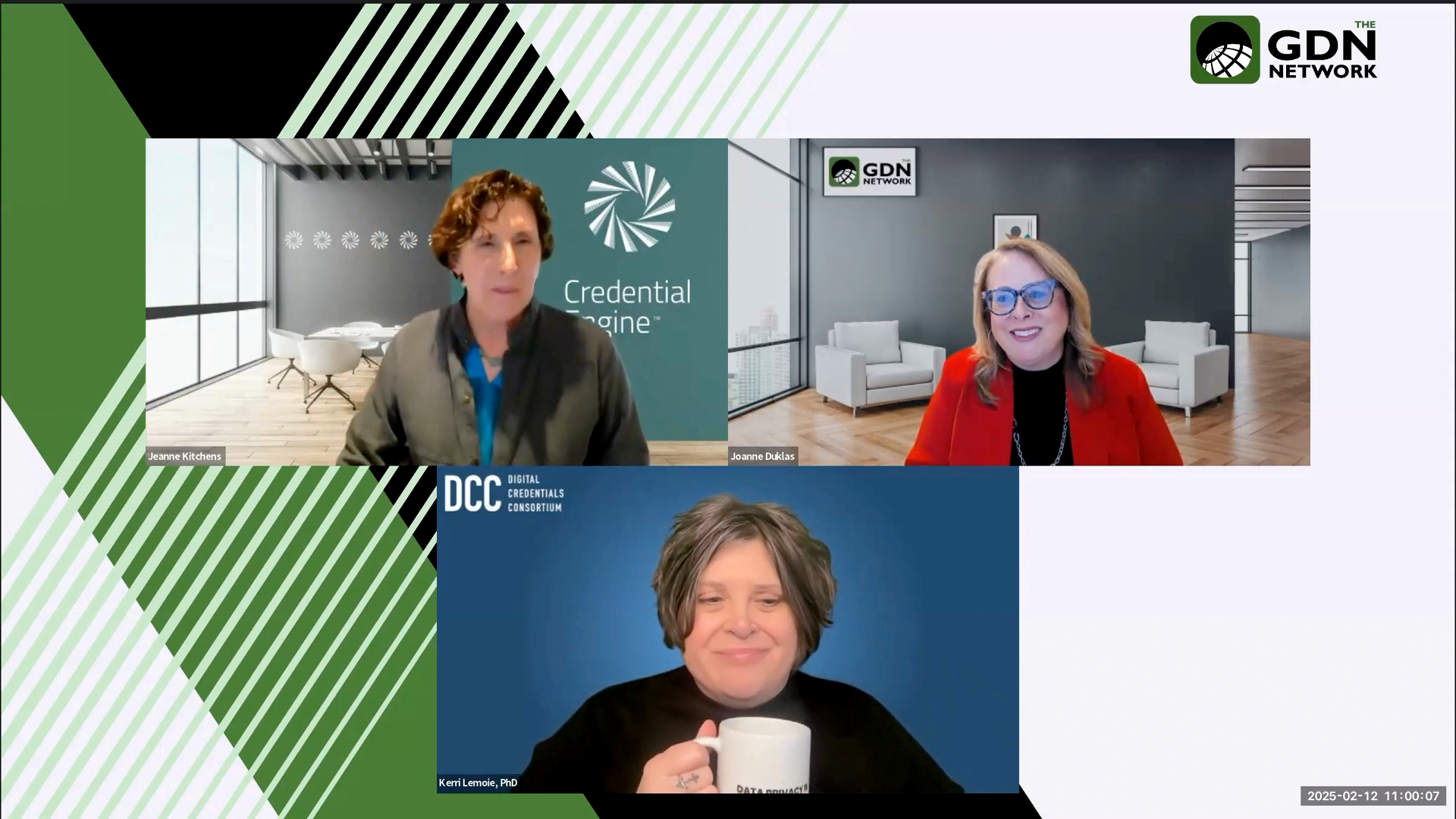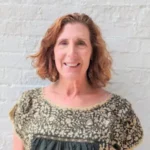GDN Conversation Series: Understanding Credential and Skill Transparency and Interoperability with Credential Engine
Advancing Learner Mobility Through Credential Transparency
When considering learner mobility, innovation discussions often focus on how to help learners move around their transcripts and diplomas to ensure rapid access to further study and work. A key aspect of helping to transform the mobility experience is exploring how to move learning outcomes, skills attainment, and course and credential data to enable more seamless mobility. Across a three-part webinar series, the GDN Network will be helping our community learn more about the transformational work of Credential Engine (CE), a not-for-profit based in the United States. CE advances transparency and coherence of non-personal (non-PII) data about the artifacts of education, training, and workforce development, such as providers, programs, credentials, skills, courses, outcomes, indicators of quality, transfer, pathways, etc. Our colleagues will share practical examples of utilizing the open-source Credential Transparency Description Language (CTDL) to enable interoperability and transparency as a key prong to supporting learner mobility.
Sessions
Feaured sessions:
- Part One: What is the CTDL, and how is it used for Transparency and Interoperability?
- Part Two: Trust and Interoperability – CE & MIT’s Digital Credentials Consortium Joint Work on Trusted Issuer Registries
- Part Three: Helpful Resources: A Technical Deep Dive into CTDL, Implementation, and Applications
Part One: What is the CTDL, and how is it used for Transparency and Interoperability?
Wednesday, January 29 – 9am ET
This first session will provide an introductory primer to Credential Transparency and the role of the open-source “credential transparency description language” (CTDL) and why this work is relevant in the context of the GDN Network and work to advance admissions and transfer for colleges, universities and Indigenous Institutes. It will provide an overview of why Texas is embracing credential transparency and how it sees this movement as vital to its mission. It will also expose participants to a broader global perspective as we work in partnership to understand the untapped opportunities to advance movement of supporting data and course and learning content as a way to enable learner access to future education and work.
CE’s CTDL: https://credentialengine.org/credential-transparency/ctdl/
Suggested Audience: Business and academic leaders involved in learner mobility work, course developers, registrars, and their teams


Presenters

Deb Everhart, Ph.D.

David R. Troutman, Ph.D.

Julia Funaki

Wednesday, February 12 – 10am ET
This session will provide a system level case example of how two organizations are working in partnership across standards and platforms to create a more interoperable and seamless experience to support learner mobility. The goal with this kind of system level work is to ensure that learners and credential evaluators and verifiers have access to the information needed to make scalable automation happen and also enable learners to have full and complete access to the right information when moving forward their education and careers.
Suggested Audience: Business and academic leaders involved in learner mobility work, course developers, registrars, and their teams, CIOs

Presenters

Jeanne Kitchens

Kerri Lemoie
- Here's some information about the Credential Transparency Description Language (CTDL) https://credentialengine.org/credential-transparency/ctdl/ and Credential Registry https://credentialengine.org/credential-transparency/credential-registry/
- This is a blog "What is an Issuer Registry?" https://credentialengine.org/resources/issuer-registries-establishing-trust-privacy-and-efficiency-in-verifying-credential-issuers/
- DCC wiki: https://wiki.dcconsortium.org/
- DCC Medium blog: https://blog.dcconsortium.org/
- https://credentialfinder.org/search?searchType=credential
- RSD = Rich Skills Descriptors https://www.edalex.com/credentialate/rich-skill-descriptors/
- Here is a sample registry (Cdn based): https://membertrustregistry.mycreds.ca/en
- Here's a blog about the specification selected for the DCC and Credential Engine issuer registry prototypes https://blog.dcconsortium.org/selecting-the-openid-federation-specification-for-the-dcc-and-credential-engine-issuer-registry-f9079f620472
- Interesting report that looks at the importance of this type of work: https://dtlab-labcn.org/en/pan-canadian-trust-registry-community-of-practice/
- If you're interested in a deep dive into the CTDL, the CTDL Handbook covers its depth and breadth https://credreg.net/ctdl/handbook
- Credential Engine welcomes any interested persons to join the CTDL Advisory Group https://credentialengine.org/advisory-groups/ctdl/
- Guidance for publishing to the Credential Registry, this is a nice starting point https://guidance.credentialengine.org/get-started-select-a-publishing-method/
- The Credential Registry has several publishing options, explained via the above link and data consuming options https://credreg.net/registry/handbook
Part Three: Helpful Resources: A Technical Deep Dive into CTDL, Implementation, and Applications
Wednesday, February 26 – 10am ET
The third session in this three-part series will provide a deep dive into the technical specifications for how the CTDL works and provide case examples. The goal with this session is to lift the hood on some of the key components of the standard to help implementers understand what is involved to enable this type of work to happen.
CE’s CTDL: https://credentialengine.org/credential-transparency/ctdl/
Suggested Audience: Business and statistical analysts, technical experts in student information systems, standards experts and staff, registrarial systems staff


GDN Conversation Series: Understanding Credential and Skill Transparency and Interoperability with Credential Engine Power Point Presentation
- Type is credentials in CTDL https://credreg.net/page/typeslist#ceterms_Credential
- To get familiar with CTDL, take a look at the credential finder, it is a tool for seeing data published as CTDL https://credentialfinder.org
- One of the best places to find in-depth information about CTDL is the handbook, https://credreg.net/ctdl/handbook
Presenters

Jeanne Kitchens

Phil Barker
Moderator for the Sessions

